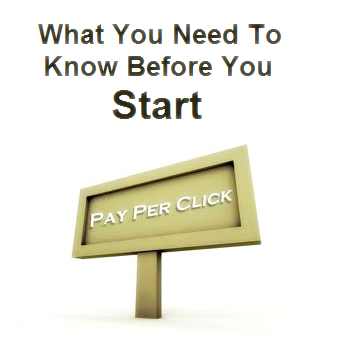It is clear that pay per click has become the most used way to advertise online. I see it as a forever expanding market, with new PPC programs, advertisers and publishers joining in their thousands daily. It is the preferred method of advertising online. The simplicity, cost efficient solution and instant results give PPC not many negatives to claim about. However, before many young new advertisers plunge into the depths of PPC, they will need to know about PPC from the start. They need to know what they might be facing and instant successful results may take time to achieve.
cost efficient solution and instant results give PPC not many negatives to claim about. However, before many young new advertisers plunge into the depths of PPC, they will need to know about PPC from the start. They need to know what they might be facing and instant successful results may take time to achieve.
PPC = Money
Like with all advertisement, it costs. For PPC, although being one of the more cost efficient forms of advertising, it is still expensive for a beginner who doesn’t have a overly huge budget. Therefore, you should budget extremely carefully to raise some capital to spend on PPC. The first few weeks even months of your campaign will not have the aim to get success results but to familiarise yourself with the logic of PPC. Once you have done that, you can concentrate more on optimising your PPC campaign.
PPC = Time
Again, I’m making PPC sound expensive and time-costly. However its not, if compared again to other types of advertisement. Even so, you will still need to put aside time to create your campaign, analyse your campaign and optimise your campaign. PPC is a time efficient form of advertising. But, it will still take time. You cannot presume that because you click a button and your campaign has started means you don’t have to put any time into it. Your PPC campaign will need constant attention. Without it, failure will occur.
Set Up Your Own Goal
Like with anything, if you have nothing to strive to achieve, you will not perform at your best. The same applied with PPC advertising. Before you start, create an aim, a goal, a motivation of which you want to achieve by a specific date. To make your aim, think of SMART:
- Specific – Make your aims specific to your and your campaign’s needs. As well as that, make them well-defined and focused.
- Measurable – This basically means for you to include numbers and dates in your aim so you can compare back from your aim to the reality of your campaign.
- Attainable – Don’t be too optimistic when setting your aim. You have to remember that you are new to this advertising network and will most likely learn from mistakes you make in the first few months. Therefore, don’t aim to achieve a high success (or conversion) rate.
- Relevant – The aim must have relevance to the outside world as well as the interest of what you want to promote. For example, if you are trying to promote a English book, don’t aim to promote the book to foreign languages where the chances are they won’t be able to read the book. You are not promoting the product to the relevant market.
- Time-Based – As I have mentioned already under attainable, your aim should have a time-frame in which you must achieve your aim by. E.g. Budget £1,000 to ‘this PPC campaign’ by ‘this date’ to use for the run up to Christmas.
Using SMART goals, you should be able to produce a fairly good aim for you to achieve as a new PPC advertiser. If you don’t achieve your aim, don’t worry! It’s early days still and make sure that you know why you didn’t achieve your aim and how you can make sure to achieve your aim next time round. Learn from your mistakes is the best way to progress.
As you can now see, there are a few things you need to ‘tick off the list’ before you get into PPC. These are not neccessities but guidlines to move you onto your way to success. If you are interested in other things you need to know about PPC: I suggest you have a look at other articles I have done:



